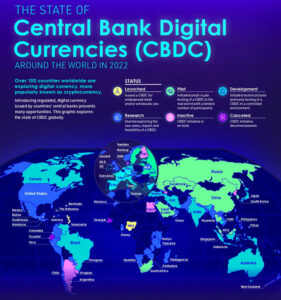CBDCs are digital representations of a country’s fiat currency, issued and regulated by the respective central bank.
This article aims to highlight the current state of CBDC development worldwide, while also examining the potential impact on financial privacy and the accessibility of decentralized cryptocurrencies like Bitcoin.
The Global Adoption of CBDCs
The race towards developing CBDCs has gained remarkable momentum, with approximately 105 countries actively engaged in various stages of CBDC implementation.
Source: Twitter
These countries can be categorized into four main stages: Launch, Research, Pilot, and Development. Let’s delve into the list of countries and their respective statuses:
- Launch Stage:
- Bahamas: The Bahamas became the pioneer in CBDC implementation with the launch of its digital currency, the Sand Dollar, in 2020.
- China: China is at the forefront of CBDC development and has already launched trials of its digital yuan in various cities.
- Research Stage:
- United States: The Federal Reserve has been conducting extensive research on a potential CBDC, with ongoing pilot programs and discussions. FEDNow is the project.
- European Union: The European Central Bank (ECB) has initiated research and consultation on the digital euro, exploring its potential benefits and implications.
- United Kingdom: The Bank of England has set up a task force to explore the possibilities of a digital pound.
- Japan: The Bank of Japan is actively researching the feasibility of a digital yen.
- Australia, Canada, Brazil, India, Russia, and numerous other countries are also in the research stage.
- Pilot Stage:
- Sweden: The Riksbank has been testing the e-krona in a pilot project to evaluate the technical feasibility and societal implications.
- South Korea: The Bank of Korea has begun piloting a CBDC project to assess its potential for future implementation.
- Development Stage:
- Singapore: The Monetary Authority of Singapore is actively developing a wholesale CBDC to facilitate interbank settlements.
- Saudi Arabia, UAE, Switzerland, Thailand, and several other countries are in the development stage of their CBDC initiatives.
Implications on Financial Privacy and Decentralized Cryptocurrencies
While the development of CBDCs presents potential benefits, such as improved payment systems and financial inclusion, it also raises concerns about privacy and the decentralized nature of cryptocurrencies like Bitcoin. CBDCs, being centralized digital currencies, can potentially allow authorities to track and monitor transactions to an unprecedented degree, compromising user privacy.
Source: Twitter
Moreover, the recent recognition of certain cryptocurrencies as securities has further emphasized the regulatory scrutiny surrounding decentralized currencies. As more countries embrace CBDCs, governments may be inclined to impose restrictions on decentralized cryptocurrencies, including Bitcoin, and categorize them as regulated assets.
Also, this regulatory approach can limit accessibility and hinder the free movement of assets recognized as commodities, undermining the original principles of decentralized finance.
Conclusion
Finally, the rapid development of CBDCs globally highlights the transformational changes taking place in the financial sector. While CBDCs offer potential benefits in terms of financial inclusivity and efficiency, it is crucial to balance these advancements with individual privacy rights and the principles of decentralized finance.
So, striking the right balance is necessary to foster a digital economy that prioritizes both innovation and privacy, allowing for the coexistence of CBDCs and decentralized cryptocurrencies to ensure a diverse and inclusive financial ecosystem in the future.
⬆️ For more cryptocurrency news, check out the Altcoin Buzz YouTube channel.
⬆️ Our popular Altcoin Buzz Access group generates tons of alpha for our subscribers. And for a limited time, it’s Free. Click the link and join the conversation today.






























